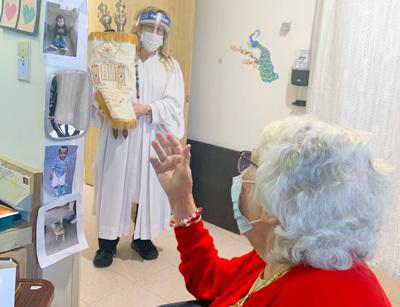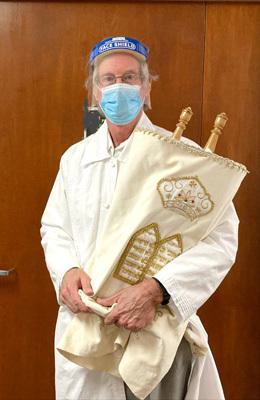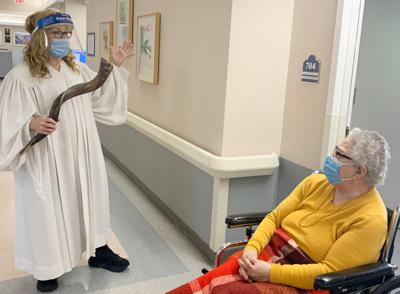A Sweet Start to a New Year at the Jewish Home


A Sweet Start to a New Year at the Jewish Home
Every year on Rosh Hashanah, Jews around the globe recite these ancient words: Hayom harat olam—Today is the day of the world's creation. It is a prayer for positivity and hope that is particularly poignant during these trying times. As we grapple with a deadly pandemic that continues to wreak havoc on our daily lives, says Rabbi Karen Bender, Skirball director of spiritual life at the Jewish Home, this is precisely the message we need.

Rabbi Bender shared her optimism during a unique series of High Holy Days services—welcoming Jewish Home residents, their families and friends, and the general public to take part in virtual celebrations of the New Year and the Day of Atonement. Shared on closed-circuit TVs in residents' rooms and on YouTube, the services enabled people from across Los Angeles and beyond to come together and embrace new possibilities for the year ahead.
My goal was to make the services special so that participants would feel connected to one another, Rabbi Bender says. I also wanted to infuse joy. As Jews, we often forget that the High Holy Days are not a sad or somber time. In fact, Yom Kippur is known as 'Shabbat ha-Shabbatot,' the Shabbat of all Shabbats. These are not days for mourning; they're a time for renewal, healing and repair.
Rabbi Bender notes that, even during a pandemic—perhaps especially during a pandemic—it is vital to seize every opportunity to uplift and engage people. Her High Holy Days services did just that, combining ritual prayer with soaring music, fun videos and other lighthearted moments.
I inserted a clip of Barbra Streisand singing Aveinu Malkeinu, which was gorgeous. During the telling of the story of Jonah, I held up an action figure—narrating the story seriously, but using props to illustrate it, she says. I also included a YouTube video of a gentleman blowing a shofar that has over one million hits. As soon as I found it, I thought to myself, 'Our residents deserve to hear the best shofar blower in the world!'

A central priority of Rabbi Bender's was involving Jewish Home residents in the services to help them feel included, inspired—and less isolated. Throughout this pandemic, seniors have really suffered because they're at greater risk from COVID-19, which means we have to take even greater precautions to keep them safe. Our message at the Home is that they might be quarantining in their rooms, but they are still vital members of a community that loves and cherishes them, she says.
Rabbi Bender videoed four residents—two from each Jewish Home campus—holding the Torah during the Kol Nidre prayer. On both Rosh Hashanah and Yom Kippur morning, while the services were being aired, she and her colleague, Eisenberg Village Rabbi Ronald Goldberg, went into as many residents' rooms as possible (outfitted in full PPE) so people could see the Torah in person and blow kisses to it if they wished.
It was a 3-D surprise while they were watching on their TVs, in 2-D, she says. It was wonderful to do such a meaningful hakafa (circling around with the Torah). It usually lasts about 15 minutes, but I carried the Torah for over an hour. I think it may have been the longest hakafa in history!
After the services were over, the reviews quickly poured in. I was spellbound, says Lenore Karish. I'm 98 years old, and these were the best services I've ever heard. I want to give the rabbis an Emmy for their hard work!
Sally Wilk was similarly enthusiastic. Rabbi Bender and her cohorts did an incredible job, she says. It meant so much for us to be with them at such a difficult time in our lives.

For her part, Rabbi Bender says the feeling was mutual. Putting these services together was such a gratifying experience, she says. It really took a village to make it happen. From the IT department's support, to the dietary department presenting holiday-appropriate food, to the nursing and activities departments preparing residents for the holidays, to the communications department getting the word out to families, everybody worked tremendously hard. It was our way of saying to our residents, who have been through so much, 'We love you, and we're here for you.'